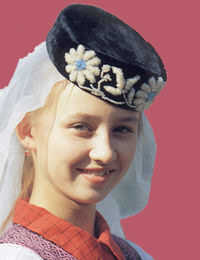 There are about 4,873 (as of 1990) Tatars in China, most of whom live in Yining, Tacheng and Urumqi in the Xinjiang Uygur Autonomous Region.
There are about 4,873 (as of 1990) Tatars in China, most of whom live in Yining, Tacheng and Urumqi in the Xinjiang Uygur Autonomous Region.
The Tatar ethnic minority has its own language, which belongs to Turkic Austronesian of the Altaic Phylum. However, as a result of frequent contact with the Uygur and Kazak people, the Tatars also use Kazak or Uygur language. The Tatars' written language is based on Arabic letters, but now they often also use Kazak and Uygur characters.
The Tatars, historically named the "Dadan, are descended from a branch of a Mongolian tribe. Their history in China dates back to the Tang Dynasty (618-907), when the Tatar tribe was ruled by the nomadic Turkic Khanate in northern China. As this state fell into decline, the Tatars grew in strength, and their name was used to refer to several tribes in the north after the Tang Dynasty. Their homeland was later annexed by Mongols, and when the Mongols pushed west, many Central Asians and Europeans called them Tatars.
In the mid-13th century, Batu, the grandson of Genghis Khan, established the Golden Horde Khanate in Central Asia. It began to decline in the 15th century, and the Kashan Khanate began to rise in the middle reaches of the Volga River and in areas along the Kama River. The rulers of the Kashan Khanate, to boast their strength, began calling themselves Tatars, the sons of the Mongols. Tatar gradually became the recognized name for the inhabitants of Kashan Khanate.
After the 19th century, the serfdom crisis in Tsarist Russia worsened, and serf owners intensified their plundering of land. Most of the Tatars' land along the Volga and Kama was grabbed, and the inhabitants were forced to flee. Some went south to Central Asia and then on to southern Xinjiang. Up to the early 20th century, a continuous stream of Tatars came to Xinjiang from Russia.
The Tatar people mainly engaged in stockbreeding, and some take trade, agriculture and handicraft industry as their occupation. Most people live in major cities in Xinjinag. Their cultural and educational undertakings are quite developed, so intellectuals are numerous
The Tatar people have strong sense of musical rhythm. Their music is full of grassland sentiment, and is accompanied by accordion, mandolin, and violin, etc. Most of the Tatar people are adherents of Islam. Tatars celebrate their "Saban Festival" (Plough Head Festival) each year after they finished their spring ploughing. Tatar people also celebrate the Corban Festival, Almsgiving Festival and Kaizhai Festival in line with other Islamic believers. Their favorite sports include wrestling, horse racing, and tug of war.
